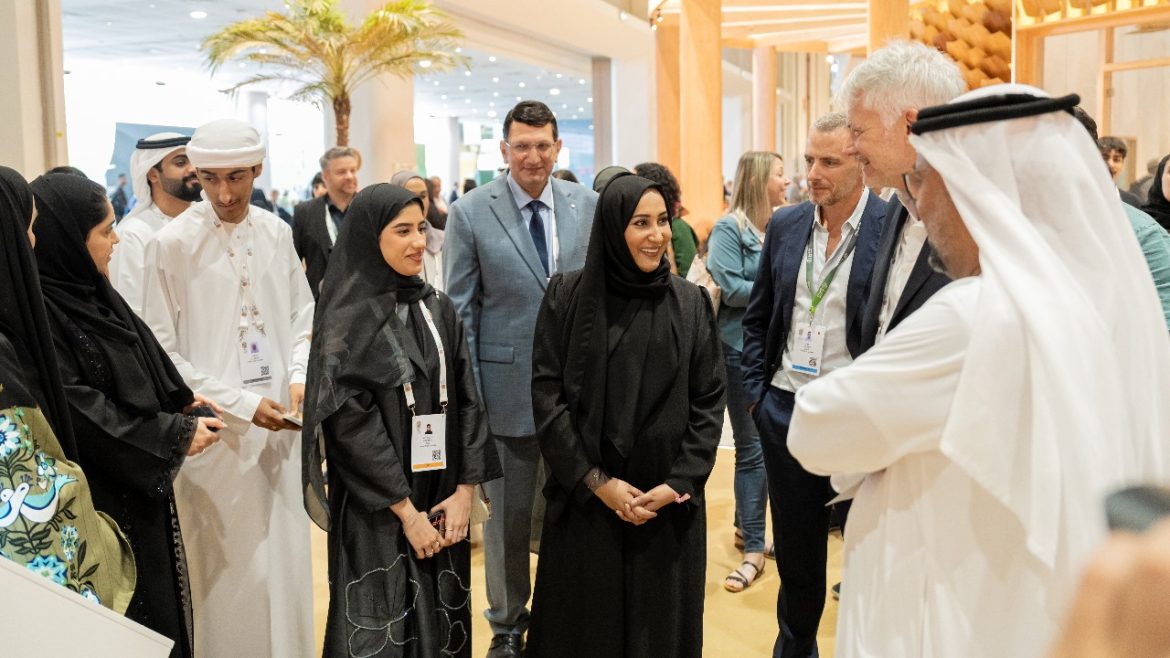The third day of the IUCN World Conservation Congress 2025 moved from pledges to practice, translating commitments into concrete, actionable pathways for oceans, finance, and community action. Hosted by the United Arab Emirates and co-organised by the Ministry of Climate Change and Environment and the Environment Agency – Abu Dhabi, the Congress, which runs from 9 to 15 October, brings together more than 10,000 delegates across the Members’ Assembly, Forum and Exhibition.
Regional leadership and collaboration were visible across the venue. The UAE Pavilion hosted the launch of the Arabic edition of the Key Biodiversity Areas Global Standard, building capacity for assessment and action across Arabic-speaking countries. Marine partnerships featured through coral reef restoration showcases, blue economy dialogues, and cross-regional learning from Antarctica, Africa, and the Red Sea.
Youth and community voices continued to shape the agenda, with sessions on youth in nature-positive economies, green jobs, community-led stewardship, and women in water governance. Cultural perspectives enriched the conversation through arts and nature dialogues and storytelling that connected conservation outcomes with daily life and livelihoods.
Morning sessions set the tone for delivery. A high-level dialogue, From Commitments to Change: Driving Transformative Action for the Ocean, outlined near-term priorities for marine resilience, restoration and coastal livelihoods. Forum deep dives into advanced practical skills, including IUCN Red List of Ecosystems, step-by-step training, ‘Better grant-making for conservation’, and ‘From classroom to Congress, engaging youth in policy-making’. Speed sessions addressed emerging frontiers such as Saving fungi, Earth’s hidden kingdom, and Mobilising the role of wild animals as a climate solution.
Financing and governance threads ran through the day. Sessions explored biodiversity credits, blended finance for Indigenous Peoples and Local Communities, and aligned financial flows with nature. Legal and rights-based approaches featured prominently, including IUCN and international courts on climate advisory opinions and Human rights-based approaches and reconciliation in conservation. Across the Exhibition and pavilions, practitioners showcased tools that move ideas into action, from PANORAMA Solutions and Contributions for Nature Platform to communications for conservation impact.
The IUCN World Heritage Outlook report outlined the actions needed to avert threats to all natural World Heritage Sites, protected by the UNESCO World Heritage Convention. The International Ranger Awards honoured ranger teams for their extraordinary courage and perseverance, while the IUCN Tech4Nature Award and the World Future Policy Award ceremony, hosted by the World Future Council, celebrated outstanding innovation and policies that set new global benchmarks for living in harmony with nature.
Innovation remained a defining theme. Delegates engaged with applications of technology in monitoring and restoration, including conservation and protection of coral reefs using advanced monitoring, and digital solutions for species and habitats, including the Wildlife Protection Map and OlmoEarth using artificial intelligence to protect the planet.
Her Excellency Dr Amna bint Abdullah Al Dahak, UAE Minister of Climate Change and Environment, said: “Day Three focused on delivery. We saw practical tools, legal pathways and financial mechanisms that help countries and communities turn goals into results. Our approach is to connect ocean resilience, nature recovery and climate action with food, water, health and jobs, so that progress for people and planet advances together.”
Her Excellency Razan Al Mubarak, President of IUCN, added: “From the Ocean Dialogue to sessions on finance, rights and technology, today showed how cooperative leadership can accelerate the Kunming–Montreal Global Biodiversity Framework. When business, governments, Indigenous Peoples, youth and civil society act together, ambition becomes measurable impact.”
Her Excellency Dr Shaikha Salem Al Dhaheri, Secretary-General of the Environment Agency – Abu Dhabi, IUCN Councillor for West Asia and Vice Chair of the Global Council on SDG 14, concluded: “Abu Dhabi continues to serve as a platform where solutions are co-created, grounded in science, informed by culture, and enabled by policy and finance. The UAE Pavilion’s work on Key Biodiversity Areas and our regional dialogues are helping partners move faster from pilots to scale.”
As the Congress enters its fourth day, delegates will deepen collaboration on species recovery, urban nature and implementation roadmaps, maintaining momentum on ocean action, green finance and inclusive governance, and reinforcing Abu Dhabi’s role as a global hub for nature diplomacy and collaborative climate action.




